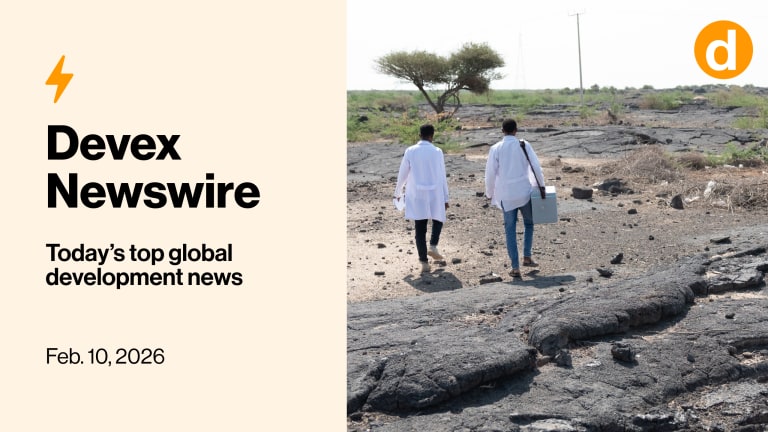Another shutdown: NSI and the grim future of Canadian NGOs
The closure of a well-regarded think tank is just the latest in a string of shutdowns and layoffs affecting small and midsize development organizations in Canada amid decreasing government funding and more stringent audits.
Early this month, the North-South Institute quietly announced that it will soon have to close its doors. NSI, an Ottawa-based think tank, had been supporting its domestic and international partners in policymaking through evidence-based research since 1976. The institute is considered one of the best research centers even outside of Canada; the Global Go To Think Tank Survey ranked NSI as one of the world’s leading think tanks with a budget of under $5 million. Its annual Canadian International Development Report, which provided a number of policy briefs on various issues regarding international development, trade and foreign affairs, was highly regarded as well. NSI relied mainly on funding from what was then the Canadian International Development Agency. Its grant ended in 2013 — the same year CIDA and Canada’s Department of Foreign Affairs and International Trade were “amalgamated” into what is now known as the Department of Foreign Affairs, Trade and Development. And that’s when NSI’s troubles began. When its grant ended, NSI applied for new funding from DFATD. At the same time, NSI’s board of directors also tried to diversify its funding sources, securing grants from foreign governments, mining companies and the Bill & Melinda Gates Foundation. However, these grants weren’t enough to “ensure financially sustainable operations,” and the board was banking on renewed support from DFATD to stay afloat. When DFATD rejected NSI’s funding request early this month, it was clear that the think tank had no other option left. “The previous agreement between the Department of Foreign Affairs, Trade and Development and the North-South Institute ended according to the contractually agreed schedule,” a DFATD representative wrote in an emailed statement. “When the North-South Institute submitted a proposal for new funding, it was considered in a timely matter, but it did not meet DFATD’s publicly posted criteria. Three years ago the North-South Institute committed to diversifying and growing its funding sources beyond the government. Two contract extensions were provided to assist the institute in their transition.” Those familiar with NSI’s financial situation know this is the bitter end to months of discussions with DFATD to keep the institute open. As Canada’s international development community mourns the demise of one of its best research centers, uncertainty over government funding of nongovernmental organizations continues to mount. Pressure on Canadian NGOs NSI’s closure reflects what many international development organizations in Canada are currently facing, especially those with annual revenue of $5 million and below. In a recent Canadian Council for International Cooperation survey, many small and midsize NGOs said their funding have been decreasing since 2010, largely as a result of reduced government grants. Conversely, organizations with annual revenue exceeding $5 million have seen funding increases consistently since 2010. Further, while the international cooperation minister established grant-funding mechanisms in 2010, no general calls for proposals have been announced since 2011, leaving small and midsize NGOs very few options for government funding. More than half of the organizations surveyed also experienced waiting time for proposal assessments of 12 months and more. Given uncertain prospects for government funding, Canadian organizations have been trying to decrease their dependence on DFATD. “These organizations are working hard to diversify their funding sources, but this doesn’t happen overnight,” CCIC spokeswoman Chantal Havard said. “All of this is affecting [their] capacity to continue doing the work they’ve been doing for years.” Politically motivated cuts, audits? Havard said several organizations have had to lay off staff, close programs or end long-standing partnerships as a result of funding decrease, although the CCIC doesn’t keep count of how many programs have been affected. Rights and Democracy, a human rights organization, shut down in 2012, and the Pearson Peacekeeping Center followed suit last year. Meanwhile, Match International, Kairos, and Development and Peace suffered substantial cuts, but managed to stay afloat by seeking other types of funding. Others have been subject to increasingly stringent audits by the Canadian Revenue Agency. Last July, Oxfam had to agree to change the terms of its mission statement to include poverty alleviation, not prevention. This came after it was told by the CRA that preventing poverty was not a charitable goal, because it may not necessarily involve poor people. And CoDev, a small NGO running programs in Latin America, was told it should translate every document it receives from its partner countries, down to travel receipts, into English or French, or risk losing its charity status. Industry insiders say these funding cuts and audits are politically motivated, as they allegedly target organizations that have been critical of the current government. CoDev, for instance, had spoken against Canada’s free trade deal with Colombia. “The closure of the North-South Institute is the latest in a long series of defunding of critical organizations that pre-dates the merger,” said Stephen Brown, a political science professor at the University of Ottawa and a specialist of Canadian foreign aid. “It’s not just trade promotion, or a lack of interest in development, but it’s a systematic silencing of critical voices. It goes even beyond development; we've seen it in the area of the environment and human rights.” NSI hasn’t given a specific date for its closure, but its board’s chair said it would likely be soon. Eight staffers, including six researchers, will be laid off. Check out more insights and analysis provided to hundreds of Executive Members worldwide, and subscribe to the Development Insider to receive the latest news, trends and policies that influence your organization.
Early this month, the North-South Institute quietly announced that it will soon have to close its doors.
NSI, an Ottawa-based think tank, had been supporting its domestic and international partners in policymaking through evidence-based research since 1976. The institute is considered one of the best research centers even outside of Canada; the Global Go To Think Tank Survey ranked NSI as one of the world’s leading think tanks with a budget of under $5 million. Its annual Canadian International Development Report, which provided a number of policy briefs on various issues regarding international development, trade and foreign affairs, was highly regarded as well.
NSI relied mainly on funding from what was then the Canadian International Development Agency. Its grant ended in 2013 — the same year CIDA and Canada’s Department of Foreign Affairs and International Trade were “amalgamated” into what is now known as the Department of Foreign Affairs, Trade and Development.
This story is forDevex Promembers
Unlock this story now with a 15-day free trial of Devex Pro.
With a Devex Pro subscription you'll get access to deeper analysis and exclusive insights from our reporters and analysts.
Start my free trialRequest a group subscription Printing articles to share with others is a breach of our terms and conditions and copyright policy. Please use the sharing options on the left side of the article. Devex Pro members may share up to 10 articles per month using the Pro share tool ( ).
Flavie Halais is a freelance journalist based in Montreal, Canada, covering international issues and cities through a social lens. Her work has appeared in WIRED, the Guardian, Le Monde Afrique, Jeune Afrique, the Correspondent ,and Devex.








